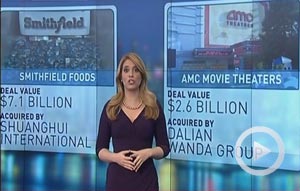Pharma giant in bribery scandal
Updated: 2013-07-16 07:14
By Zhou Wenting and Wang Hongyi in Shanghai (China Daily)
|
||||||||
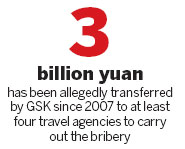
GSK executives handed out bribes to doctors and took cash rake-offs
Senior executives at Britain's largest drugmaker, GlaxoSmithKline, allegedly accepted cash rake-offs and paid bribes to officials and doctors to boost sales and prices of its drugs in China, police said on Monday.
The company allegedly used at least four travel agencies to funnel more than 3 billion yuan ($489 million) in bribes since 2007, said Gao Feng, an economic crimes investigator with the Ministry of Public Security.
Some travel agencies had offered sexual services to senior executives in GSK for four years to maintain business contacts, police said.
This case, a focal event of the industry, is believed by insiders to act as an wake-up call for China's pharmaceuticals sector.
The company said in a statement on Monday it was "deeply concerned and disappointed by these serious allegations of fraudulent behavior and ethical misconduct by certain individuals at the company and third-party agencies.
"GSK has zero tolerance for any behavior of this nature. GSK shares the desire of the Chinese authorities to root out corruption. These allegations are shameful and we regret this has occurred."
It pledged to "cooperate fully" with Chinese investigating authorities and said it had stopped using the travel agencies that have been identified so far.
Executives confess
More than 20 employees from GSK (China) Investment Co and travel agencies have been investigated by police, including four senior Chinese executives at the pharmaceuticals giant who have been detained.
They are vice-president and general operations manager Liang Hong, vice-president and human resources director Zhang Guowei, legal affairs director Zhao Hongyan, and business development manager Huang Hong.
The executives have confessed to bribery and tax-related violations, the ministry said, adding that the case involved a large number of staff and a huge sum of money over an extended period of time.
Police are probing other officials and hospitals that may be involved.
The case emerged after police found the annual turnover of Shanghai Linjiang International Travel Service had surged from millions of yuan to hundreds of millions of yuan in recent years with little travel business, and later discovered its cooperation with GSK since 2007.
The travel service could not be reached by China Daily on Monday. The company's Web page cannot be opened.
According to the national directory assistance service network 114, the company did not register its telephone number on the platform.
One way the executives obtained cash rake-offs was lying about the size of a convention. For example, the travel agency provided an invoice for a meeting of 50 people when it only involved 30 attendees, police said.
Liang is reported to have taken rake-offs of nearly 2 million yuan from Shanghai Linjiang from 2010 to 2012. "The four senior executives had respective travel agencies they worked with and took money for convention orders," police said.
The rest of the illicit money was used to bribe officials, hospital managers and doctors so that they would place orders for GSK drugs.
"I had been in contact with senior government officials and medical experts," Xinhua News Agency quoted Liang as saying.
Liang supervised about 3,000 medical representatives across China to deal with hospitals and doctors, and was authorized to approve an annual budget of hundreds of millions of yuan.
Raising drug prices
Weng Jianyong, legal representative of the travel service, said that when planning to visit officials and experts, Liang would call him to get some cash ready. Weng has also been held by police.
Liang told police that to introduce medicines into the market he had to deal with various authorities responsible for drug administration, pricing and medical insurance, as well as hospital directors and doctors.
The bribes could account for at least 20 percent of the prices of medicines, he said.
"Many imported drugs in China are sold at very high prices. Inherent in such high prices are the drug makers' operation costs which also includes the cost of bribes," said a former employee with a foreign pharmaceuticals company who wished to remain anonymous. "It's very common for sales staff to funnel money to doctors by various means, such as academic conferences and consultant fees."
Liu Xianquan, dean of the Law School at East China University of Political Science and Law, said he believes that the system for purchasing medicines in hospitals should be reformed.
"It's important for China's health authorities to make a change in the drug and medical equipment procurement system, which has a big loophole.
"Doctors rely on huge prescriptions of drugs to increase their income. In this regard, the patients have to bear more economic pressure."
Contact the writers at zhouwenting@chinadaily.com.cn and wanghongyi@chinadaily.com.cn
(China Daily USA 07/16/2013 page1)
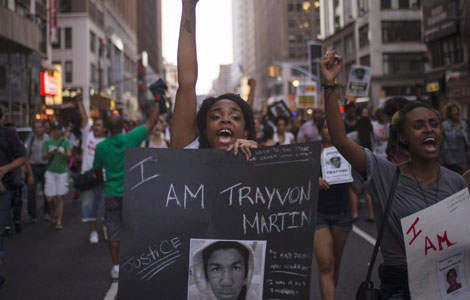
 Obama urges restraint amid protests
Obama urges restraint amid protests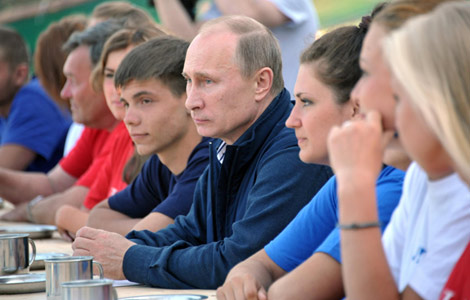
 Putin wants Snowden to go, but asylum not ruled out
Putin wants Snowden to go, but asylum not ruled out
 Apple to probe death of Chinese using charging iPhone
Apple to probe death of Chinese using charging iPhone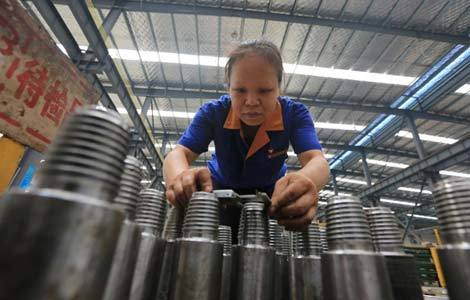
 Investment falters as industrial activity flags
Investment falters as industrial activity flags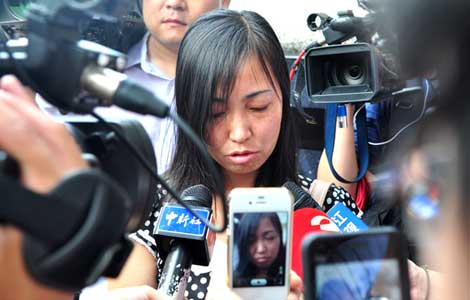
 Rape victim's mother wins appeal
Rape victim's mother wins appeal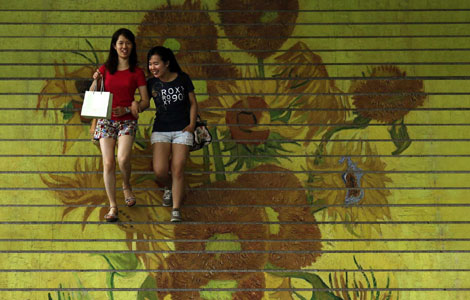
 Reproduction of 'Sunflowers' displayed in HK
Reproduction of 'Sunflowers' displayed in HK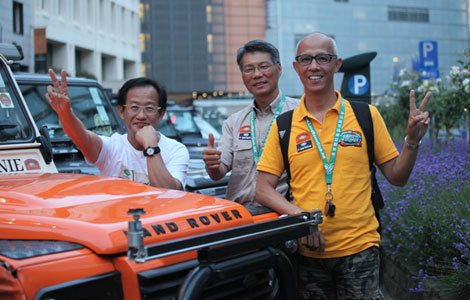
 Land Rover enthusiasts tour the world
Land Rover enthusiasts tour the world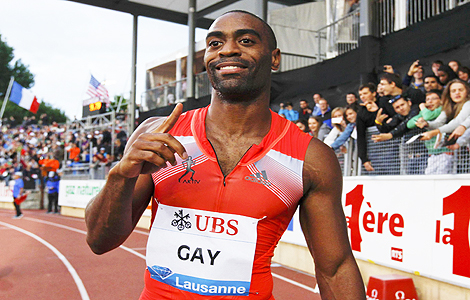
 US star sprinter fails drug test
US star sprinter fails drug test
Most Viewed
Editor's Picks

|

|

|

|

|

|
Today's Top News
China calls for new talks on Iran nuclear issue
Global warming may largely raises sea level
Putin wants Snowden to go, asylum not ruled out
Top foreign study destinations for Chinese
Trailblazer reaches out to inmates on death row
Air crash payouts could differ
Cabinet promises more funds for smaller firms
Capital prison tests therapy on inmates
US Weekly

|

|

